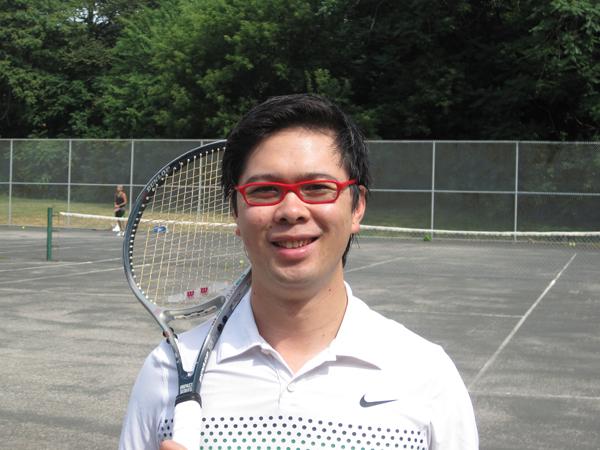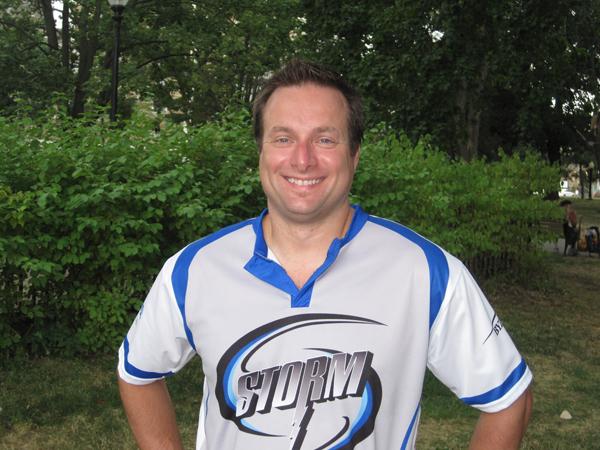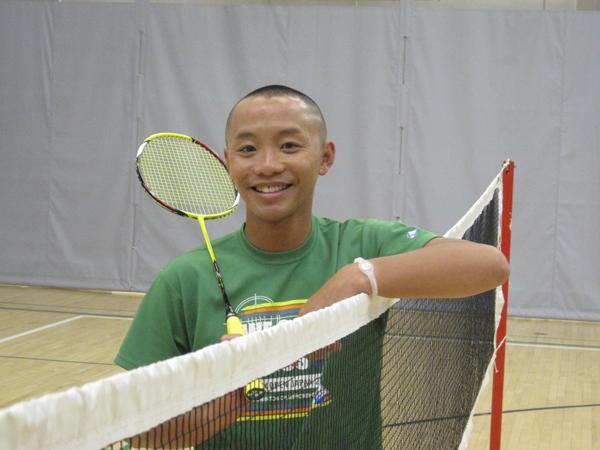
"I'm choosing tennis over badminton because I feel like I've already peaked in badminton," says Vong Sundara. Credit: Ted Flett

"I like socializing with the other team members but really enjoy being physical and the sport aspect," says Ken Jones. "I play to win." Credit: Ted Flett
It’s a case of quality over quantity when summing up Team Toronto at this week’s North America Outgames in Vancouver. Recruiting Toronto’s gay and lesbian athletes for the July 25 to 31 continental multi-sport championships has been a challenge.
“There are local competitions scheduled around this same time and then there’s always the economy,” explains David Langan, OutSport Toronto’s director of marketing and communications, of the shortfall.
Further, the gay and lesbian sports organization’s reach is limited to its team sport members such as football, hockey and volleyball leagues. Langan’s communication channels to athletes in golf, dance or track and field are splintered, though it’s something he hopes to improve in the future.
The Outgames include 13 sports, a mix of team and individual, including eco-challenge, inspired by The Amazing Race. In addition to sport, the event features an opening ceremony, human rights conference and coincides with Vancouver Pride.
Greg Larocque, president of the Gay and Lesbian International Sport Association’s North American chapter, was counting on the talent pool of Toronto’s gay and lesbian athletes.
“It’s a little disappointing,” he says from his home in Vancouver. “I understand matters of money and other competitions, but if you really want to compete in your sport, you want to challenge yourself at an event with an international level of competition and you’re not going to find that locally.”
Larocque can also relate to the difficulty of marketing to athletes, a familiar problem in Vancouver. He was, however, in Toronto last year promoting the games. Rainbow High Vacations was contracted to provide travel packages.
While the registration deadline was July 25. Larocque estimates 1,200 participants with generous teams from Calgary, Edmonton and Winnipeg. Fewer than 50 are from Toronto.
Despite the team’s small size, Toronto’s athletes are steadfast in their pursuit of pride, personal best performances and the podium. Here’s a look at three medal threats:
The champion: Joseph Wong
Thirty-six-year-old Joseph Wong’s biggest challenging signing up for Vancouver’s Outgames was picking which sports. An all-around athlete with a lean frame and quick reflexes, Wong excels at tennis, softball, curling, volleyball, beach volleyball and badminton.
“I always look forward to September when league sports start up again,” he says.
He finally settled on volleyball and badminton but his strategy and preparation for each sport is different.
In volleyball, Wong is competing with his Toronto Spartan Volleyball League team, El Toro. A power hitter and setter, Wong thrives in gay sports, especially on the volleyball court. “Playing with gay people and in gay leagues, there can be a lot of drama and it’s fun that way,” he says. “There’s heavy grunting, hollers and calling one another bitch, all in fun. You can be yourself and not worry about people judging you for who you are.”
The sports arena wasn’t always comforting. Growing up as a badminton athlete, Wong says he couldn’t hide his sexuality and was chastised. “I played the sport as myself and effeminately in the eyes of some others,” he recalls. “Some people laughed at me or joked. It was hard.”
Another benefit of gay sports leagues for Wong has been making friends in the community. Wong says fellow players have also found partners through the leagues.
In his first international gay competition at the 2006 World Outgames in Montreal, Wong excelled, winning bronze in beach volleyball. “I played with a lot of adrenaline,” he says. “It was very serious and you don’t want any balls to drop,” he says.
He’s also prepared for the pressure of an audience. “Having people around makes me play better and even step up the drama a notch or two,” he says. “We’ll be a bit more flamboyant and scream extra loudly.”
But Wong says he will temper the energy and remain focused to avoid a “facial”: getting hit squarely in the face by the volleyball. “I’ve seen it happen and thought, ‘Man, I don’t want that.’”
Wong can’t rely on El Toro’s team solidarity. With the Outgames staged off season, El Toro’s composition for Vancouver has changed with half the players new to the team.
On the badminton court, Wong is drawn by the sport’s individual competition. “I love the team atmosphere and support of volleyball but also love competing by myself,” he says. “You’re not upsetting anyone if you don’t succeed.”
A player since age nine and a strong member of Toronto’s gay badminton league, BADinTO, success is common for Wong. He’s a podium regular at local and international competitions.
Off the court, Wong is keen explore Vancouver, hit the beach and celebrate Pride. “But it’s competition first,” he says.
The underdog: Vong Sundara
Tennis player Vong Sundara’s reasons Vancouver ambitions are simple. “I just want to go out there and have fun,” he says from his home at Church and Richmond Streets. “If I can medal, great, but I just want to have a good time.”
Sundara, 30, hasn’t picked the easiest route to a podium finish. He is still getting the swing of tennis whereas the long time competitive badminton player has mastered the art of keeping a birdie in the air. Born in Thailand but Canadian since age three, Sundara was Manitoba’s provincial high school badminton champion.
The sport is a family affair. Sundara’s father was once a member of Thailand’s national badminton team. He played tennis since childhood but only recreationally, applying his focus on badminton, just like dad, but not any more.
“I’m choosing tennis over badminton because I feel like I’ve already peaked in badminton and I’m never going to get back to that level,” he says. “Whereas in tennis I feel like my best days are ahead of me. I’m still at a low level and there’s a lot to learn. I like changing it up”
Tennis presents new compelling challenges for Sundara. “If you’re a good badminton player, the chance of having a bad day is almost zero,” he says. “But in tennis you have no idea what will happen on the day of the match, outside there could be wind, courts could be clay or grass, your opponent may have a different style, there’s just so much more variety.”
Sundara has not missed an Outgames. At the 2006 World Outgames in Montreal, he took a silver medal in badminton. At the 2007 North American Outgames in his then-hometown of Calgary, he organized the human rights conference portion of the event.
One of the guest speakers, Sundara gave a rousing speech on AIDS awareness and was afterwards approached by a comedy agent in the audience who advised he consider comedic training. The engineering graduate took his advice and last year founded Comedy Cares, a touring comedy show that supports emerging charities.
Despite his comedic side, Sundara doesn’t mix business and sport. Tennis is no laughing matter. “I’m pretty boring when I’m on the court because I’m pretty focussed and not making much noise,” he says.
His role model in tennis is Steffi Graf, known for adopting unconventional tennis manoeuvres. “She changed the perceptions of what tennis was,” Sundara says of his heroes. “Her random forehands were technically incorrect but they succeeded and I like the players who come in and change how the game is played. Otherwise, we’d be playing the way it was done in the ’70s.”
The dark horse: Ken Jones
Forty-four-year-old Ken Jones enters the Outgames as an unknown. It’s uncertain if the New Brunswick native will medal, or even compete. But the mild-mannered software programmer’s determination is likely to get him onto the softball diamond.
“I have a competitive edge in me,” Jones says, smiling. “I like socializing with the other team members but really enjoy being physical and the sport aspect. I play to win.”
After a strong season, Jones’ Toronto softball team, named Storm, qualified for the sport’s world series in Chicago. Building towards the September competition, Vancouver’s Outgames did not fit into the team’s schedule.
But Jones is keen to return to the city he lived and competed in for years before moving to the Toronto in November when his software company closed their west coast office. He’ll rely on relationships in the sports community to join a team that needs an additional player due to a cancellation or injury.
If Jones manages to slip into a team jersey, his fellow players will be lucky. The left outfielder is a good catch. “I’m fast and can really run, even at my advanced age,” Jones says laughing. “But I also have good team spirit and generally get along with everyone.” And he knows the game. Jones has played softball off and on since he was 19. In Vancouver he even managed a team and was a league commissioner.
Jones is confident in his strength on the team. During a softball competition over Toronto Pride, Jones was hosting his visiting sister and unable to play. Storm lost and Jones speculates the team might have done better had he played.
The drive to compete in Vancouver is part vindication for Jones.
In 2006, playing as part of a Vancouver softball team, Jones arrived in Montreal for the World Outgames primed and inspired. “The atmosphere, the spirit, the feel of the city itself was all amazing,” Jones recalls.
Jones had played well all season and even upped his practice time and gym routine to be at his physical peak. But once on the diamond, Jones says the team was plagued by poor fields and officiating and eliminated in the first round. It was dissatisfying.
Entering Vancouver, Jones doesn’t have the same game plan. But unknown territory is familiar. Off the diamond, he has moved several times, living in Tokyo and San Francisco prior to returning to Canada. Recently single after a long-term relationship, Jones has quickly formed a social network in Toronto through softball, Toronto’s Out & Out club and euchre tournaments.
“This time around, I’m not too concerned about where I finish, normally I prefer to win but I’m going into it sort of blind,” he admits.
* * *
Check out our video report from the opening of the Outgames in Vancouver.

 Why you can trust Xtra
Why you can trust Xtra


